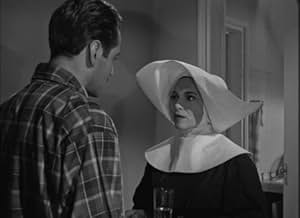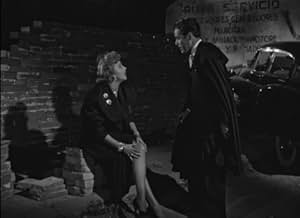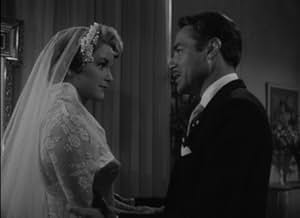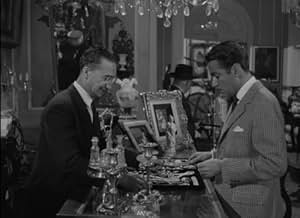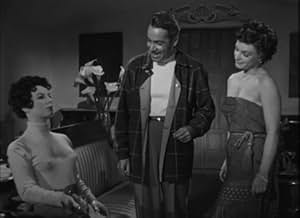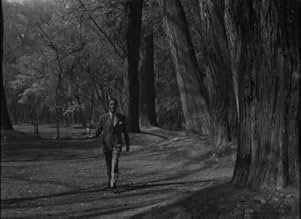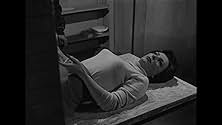VALUTAZIONE IMDb
7,6/10
6232
LA TUA VALUTAZIONE
Il viaggio delirante di un uomo con disturbi mentali, ossessionato dal compiere il crimine perfetto.Il viaggio delirante di un uomo con disturbi mentali, ossessionato dal compiere il crimine perfetto.Il viaggio delirante di un uomo con disturbi mentali, ossessionato dal compiere il crimine perfetto.
- Regia
- Sceneggiatura
- Star
- Premi
- 1 vittoria e 8 candidature totali
Ariadne Welter
- Carlota Cervantes
- (as Ariadna Welter)
José María Linares-Rivas
- Willy Corduran
- (as J.M. Linares Rivas)
Enrique Díaz Indiano
- Señor de la Cruz
- (as Enrique Indiano)
Carlos Martínez Baena
- Padre Alonso
- (as Carlos M. Baena)
Armando Acosta
- Hombre casa juegos
- (non citato nei titoli originali)
Eduardo Alcaraz
- Gordo Azuara
- (non citato nei titoli originali)
Janet Alcoriza
- Turista de Oklahoma
- (non citato nei titoli originali)
Recensioni in evidenza
Yet another perfectly constructed story by Buñuel, but this time the pace of the film just doesn't feel right. As a viewer i usually have found myself trapped between the unceasing spanish dialogues. The portray of a mentally ill killer should've been more distant from the common reality, if not within the dialogues, then through the usage of scenery and theatrical production, which in this case was monotone and non-corresponding to a thrilling-tempting view
The delirious journey of a mental disordered man (Archibaldo de la Cruz) , who is obsessed in making the perfect crime. As boy, Archibaldo witnesses his governess' death and is fascinated by what he feels . As a man he's obsessed with murder and dying . Undoubtedly, death encircles the always obsessed Archibaldo, and the targets are ordinarily unfortunate women (Miroslava who subsequenly committed suicide , Rita Macedo, Ariadna Welter).
A bitter and attractive diatribe about a boy who seeing the death of his governess has a lasting effect on his adult life , as he grows up to be a demented cretin -well played by Ernesto Alonso- whose failure with women leads him to conspire to kill every one he meets , a task at which he also fails . Buñuel marshals all of his characteristic amoral wit in this story of a would-be murderer at every turn in his efforts to get his kicks from a unsuccessful sex murder . This is an enjoyable but minor psychological drama from Buñuel in Spanish with English subtitles , dealing with a strange and powerful obsession stemming from a pampered childhood . As usual, the Spaniard master schews the visual fussiness of style , opting for the straightforward camera set-up at all times. The use of props like the toy music box from his infancy which triggers off Archibaldo's lust and the wax dummy burned one of his attempts is thwarted , is all the more hilarious and surprising as a result .
This agreeable motion picture was produced in short budget by Roberto Figueroa and Alfonso Patiño Gómez ; being compellingly directed by Luis Buñuel who was voted the 14th Greatest Director of all time . This Buñuel's peculiar film belongs to his Mexican period ; in fact , it's plenty of known Mexican actors . Born in Calanda , Aragon (1900) , Buñuel then moved to Madrid to study at the university there, where his close friends included Salvador Dalí and Federico García Lorca . After moving to Paris , at the beginning Buñuel did a variety of film-related odd jobs , including working as an assistant to director Jean Epstein . With financial help from his mother and creative assistance of the surrealist Dalí, he made his first film , a 17-minute short titled "Un Chien Andalou" (1929), and immediately catapulted himself into film history thanks to its disturbing images and abstract plot . The following year , sponsored by wealthy art patrons, he made his first picture , the scabrous witty and violent "Age of Gold" (1930), which mercilessly attacked the church and the middle classes, themes that would preoccupy Buñuel for the rest of his career . That career, though, seemed almost over by the mid-1930s, as he found work increasingly hard to come by and in the pre-Spanish Civil War , he made the documentary ¨Las Hurdes¨(1933) , the Luis emigrated to the US where he worked for the Museum of Modern Art and as a film dubber for Warner Bros . He subsequently started his Mexican period and he teamed up with producer Óscar Dancigers and after a couple of unmemorable efforts shot back to international attention with the lacerating study of Mexican street urchins in ¨Los Olvidados¨ (1950), winning him the Best Director award at the Cannes Film Festival. But despite this new-found acclaim, Buñuel spent much of the next decade working on a variety of ultra-low-budget films, few of which made much impact outside Spanish-speaking countries , though many of them are well worth seeking out . As he went on filming "The Great Madcap" , ¨The brute¨, "Wuthering Heights", ¨El¨ , "The Criminal Life of Archibaldo De la Cruz" , ¨Robinson Crusoe¨ , ¨Death in the garden¨ and many others . Rating "Criminal life of Archibaldo de la Cruz" : 6.5/10 , decent movie , but much too talky , it sounds far more interesting than it plays.
A bitter and attractive diatribe about a boy who seeing the death of his governess has a lasting effect on his adult life , as he grows up to be a demented cretin -well played by Ernesto Alonso- whose failure with women leads him to conspire to kill every one he meets , a task at which he also fails . Buñuel marshals all of his characteristic amoral wit in this story of a would-be murderer at every turn in his efforts to get his kicks from a unsuccessful sex murder . This is an enjoyable but minor psychological drama from Buñuel in Spanish with English subtitles , dealing with a strange and powerful obsession stemming from a pampered childhood . As usual, the Spaniard master schews the visual fussiness of style , opting for the straightforward camera set-up at all times. The use of props like the toy music box from his infancy which triggers off Archibaldo's lust and the wax dummy burned one of his attempts is thwarted , is all the more hilarious and surprising as a result .
This agreeable motion picture was produced in short budget by Roberto Figueroa and Alfonso Patiño Gómez ; being compellingly directed by Luis Buñuel who was voted the 14th Greatest Director of all time . This Buñuel's peculiar film belongs to his Mexican period ; in fact , it's plenty of known Mexican actors . Born in Calanda , Aragon (1900) , Buñuel then moved to Madrid to study at the university there, where his close friends included Salvador Dalí and Federico García Lorca . After moving to Paris , at the beginning Buñuel did a variety of film-related odd jobs , including working as an assistant to director Jean Epstein . With financial help from his mother and creative assistance of the surrealist Dalí, he made his first film , a 17-minute short titled "Un Chien Andalou" (1929), and immediately catapulted himself into film history thanks to its disturbing images and abstract plot . The following year , sponsored by wealthy art patrons, he made his first picture , the scabrous witty and violent "Age of Gold" (1930), which mercilessly attacked the church and the middle classes, themes that would preoccupy Buñuel for the rest of his career . That career, though, seemed almost over by the mid-1930s, as he found work increasingly hard to come by and in the pre-Spanish Civil War , he made the documentary ¨Las Hurdes¨(1933) , the Luis emigrated to the US where he worked for the Museum of Modern Art and as a film dubber for Warner Bros . He subsequently started his Mexican period and he teamed up with producer Óscar Dancigers and after a couple of unmemorable efforts shot back to international attention with the lacerating study of Mexican street urchins in ¨Los Olvidados¨ (1950), winning him the Best Director award at the Cannes Film Festival. But despite this new-found acclaim, Buñuel spent much of the next decade working on a variety of ultra-low-budget films, few of which made much impact outside Spanish-speaking countries , though many of them are well worth seeking out . As he went on filming "The Great Madcap" , ¨The brute¨, "Wuthering Heights", ¨El¨ , "The Criminal Life of Archibaldo De la Cruz" , ¨Robinson Crusoe¨ , ¨Death in the garden¨ and many others . Rating "Criminal life of Archibaldo de la Cruz" : 6.5/10 , decent movie , but much too talky , it sounds far more interesting than it plays.
Following your advice, I recently `relented' to buying from Alapage the two Luis Bunuel Double-Feature discs released in France by Film Sans Frontieres. After watching them in their entirety, I cannot believe that I, who consider Bunuel my all-time favorite director and one of the true masters of the medium, have waited this long to acquire these DVDs. Actually while Alapage listed these DVDs at EUR25.73 on their site, they only cost me EUR21.51 each (excluding EUR12 shipping charges). So, if there is still anybody who has not purchased them yet, now may be the time to do so!
Since I had never watched EL (1952) before, it was the first one to go through my DVD player. It was a chilling parable of an insanely jealous middle-aged man played with acute intensity by Arturo De Cordova. It afforded Bunuel ample opportunity to make practical use of overt Freudian symbolism without lending the film a heavy-handed air of pretentiousness. While there are some critics who consider it as merely `an engaging, minor work', I regard it as being among Bunuel's finest; arguably, with this film, Bunuel reached the culmination of his work in Mexico, but it also looks forward to similar sequences and themes he would tackle later on in his career, especially TRISTANA (1970) and, his last film, THAT OBSCURE OBJECT OF DESIRE (1977).
EL was beautifully abetted by another of his low-budget Mexican films, the great black comedy THE CRIMINAL LIFE OF ARCHIBALDO DE LA CRUZ (1955). Again, critical reception was a bit muted in some circles, dismissing it as `just a throwaway oddity' typical of Bunuel's films of the period. However, it is much more than that: it is certainly very funny if you can accept its macabre sense of humor. It allowed Bunuel to create some of the most memorable images in all of his films, especially the celebrated dummy incineration scene, which could have been "inspired" by a similar scene in Michael Curtiz's marvelous MYSTERY OF THE WAX MUSEUM (1933) which Bunuel must have seen while working at Warner Bros. in the Thirties. A similar instance of this eclectic approach on Bunuel's part can be found in the "walking hand" sequence in his THE EXTERMINATING ANGEL (1962) - one of my favorite Bunuels - which harks back to an identical premise in Robert Florey's THE BEAST WITH FIVE FINGERS (1946), another Warner Bros. horror melodrama. For me, one of the enduring assets of THE CRIMINAL LIFE OF ARCHIBALDO DE LA CRUZ is the charm and great beauty that was Miroslava Stern (who played the part of Lavinia and was the model for the ill-fated dummy). Tragically, she would take her own life a mere two weeks after the film's release with her body, ironically enough, ending up cremated!
Both the print utilized and the transfer for both films were adequate enough, and perfectly acceptable under the circumstances. However, EL's overall visual and aural qualities where distinctly superior to those of ARCHIBALDO which suffered from excessive specks and slight audio dropouts at times, but were never so alarming as to dispel from one's viewing pleasure of the film.
Since I had never watched EL (1952) before, it was the first one to go through my DVD player. It was a chilling parable of an insanely jealous middle-aged man played with acute intensity by Arturo De Cordova. It afforded Bunuel ample opportunity to make practical use of overt Freudian symbolism without lending the film a heavy-handed air of pretentiousness. While there are some critics who consider it as merely `an engaging, minor work', I regard it as being among Bunuel's finest; arguably, with this film, Bunuel reached the culmination of his work in Mexico, but it also looks forward to similar sequences and themes he would tackle later on in his career, especially TRISTANA (1970) and, his last film, THAT OBSCURE OBJECT OF DESIRE (1977).
EL was beautifully abetted by another of his low-budget Mexican films, the great black comedy THE CRIMINAL LIFE OF ARCHIBALDO DE LA CRUZ (1955). Again, critical reception was a bit muted in some circles, dismissing it as `just a throwaway oddity' typical of Bunuel's films of the period. However, it is much more than that: it is certainly very funny if you can accept its macabre sense of humor. It allowed Bunuel to create some of the most memorable images in all of his films, especially the celebrated dummy incineration scene, which could have been "inspired" by a similar scene in Michael Curtiz's marvelous MYSTERY OF THE WAX MUSEUM (1933) which Bunuel must have seen while working at Warner Bros. in the Thirties. A similar instance of this eclectic approach on Bunuel's part can be found in the "walking hand" sequence in his THE EXTERMINATING ANGEL (1962) - one of my favorite Bunuels - which harks back to an identical premise in Robert Florey's THE BEAST WITH FIVE FINGERS (1946), another Warner Bros. horror melodrama. For me, one of the enduring assets of THE CRIMINAL LIFE OF ARCHIBALDO DE LA CRUZ is the charm and great beauty that was Miroslava Stern (who played the part of Lavinia and was the model for the ill-fated dummy). Tragically, she would take her own life a mere two weeks after the film's release with her body, ironically enough, ending up cremated!
Both the print utilized and the transfer for both films were adequate enough, and perfectly acceptable under the circumstances. However, EL's overall visual and aural qualities where distinctly superior to those of ARCHIBALDO which suffered from excessive specks and slight audio dropouts at times, but were never so alarming as to dispel from one's viewing pleasure of the film.
Handsome and well-heeled Archibaldo has been convinced from boyhood that he possesses a music box that has the power to kill. He embarks upon a career as a serial murderer in which his intended victims are ravishing looking females but Fate continually thwarts his lethal intentions and his murders never get past the fantasy stage.
The most notorious scene in the film and one of which only this director is capable, is where Archibaldo consigns to the flames of a kiln a wax model of one of his potential victims who has slipped through his grasp. This macabre episode has acquired a tragically ironic overtone as the woman who has modelled for the dummy is played by Miroslava Stern who was cremated shortly after filming completed, having taken her own life. Bunuel was of course to employ a 'prosthetic limb' to great effect in 'Tristana'.
Working within the budgetary limitations of Mexican cinema, director Luis Bunuel has fashioned a stylish, sophisticated and technically polished piece that contains some delicious performances and bizarre Bunuelian moments that linger long in the memory.
Although condemned by circumstances to being innocent of murder Archibaldo still feels the need to 'confess' to the police. He is politely dismissed by a detective with the words:"thinking about murdering someone does not constitute a crime." This will strike a chord with most of us I am sure!
The most notorious scene in the film and one of which only this director is capable, is where Archibaldo consigns to the flames of a kiln a wax model of one of his potential victims who has slipped through his grasp. This macabre episode has acquired a tragically ironic overtone as the woman who has modelled for the dummy is played by Miroslava Stern who was cremated shortly after filming completed, having taken her own life. Bunuel was of course to employ a 'prosthetic limb' to great effect in 'Tristana'.
Working within the budgetary limitations of Mexican cinema, director Luis Bunuel has fashioned a stylish, sophisticated and technically polished piece that contains some delicious performances and bizarre Bunuelian moments that linger long in the memory.
Although condemned by circumstances to being innocent of murder Archibaldo still feels the need to 'confess' to the police. He is politely dismissed by a detective with the words:"thinking about murdering someone does not constitute a crime." This will strike a chord with most of us I am sure!
10zetes
Perhaps my favorite of Buñuel's Mexican years. As a child, Archibaldo de la Cruz willed the death of his young, sexy nanny through the device of a magical music box. As an adult, he finds this box at a pawn shop, and it awakens the exciting feelings he had as he stood over the corpse of his nanny checking out her exposed thigh. He decides to become a serial killer, but it never quite works out that way. Every person he sets out to kill ends up being murdered by another's hand. Actually, I shouldn't say "person," as Archibaldo's violent emotions only arise towards women. There is some heavy Catholic symbology to the picture, and the violence towards women obviously arises from the twisted mores of Catholicism. His first intended victim as an adult, for example, is a brazen tramp who openly expresses her wish to seduce him to get back at her husband. Buñuel had perhaps the most impeccable sense for creating finales, and the one here is as odd and remarkable as any other. Watch the two actions Archibaldo performs with his cane. I'm not 100% sure what they signify, but I know that must be of the utmost importance. Ensayo de un crimen should be watched back to back with Buñuel's 1953 film, Él, also about a man being driven insane over his wife because of his strict religious beliefs. 10/10.
Lo sapevi?
- QuizThe movie was shot in the middle of a big economic crisis for the Mexican cinema. Production was about to be shut down a few times and the famous scene with the mannequin being cremated was filmed only once because they couldn't afford another mannequin.
- BlooperWhen the nun falls down the empty elevator shaft she screams loudly but the sound is obviously that of a man; in fact, it sounds like a Wilhelm Scream.
- ConnessioniFeatured in Miroslava (1993)
I più visti
Accedi per valutare e creare un elenco di titoli salvati per ottenere consigli personalizzati
- How long is The Criminal Life of Archibaldo de la Cruz?Powered by Alexa
Dettagli
- Data di uscita
- Paese di origine
- Lingue
- Celebre anche come
- The Criminal Life of Archibaldo de la Cruz
- Luoghi delle riprese
- Azienda produttrice
- Vedi altri crediti dell’azienda su IMDbPro
- Tempo di esecuzione1 ora 29 minuti
- Colore
- Mix di suoni
- Proporzioni
- 1.37 : 1
Contribuisci a questa pagina
Suggerisci una modifica o aggiungi i contenuti mancanti


